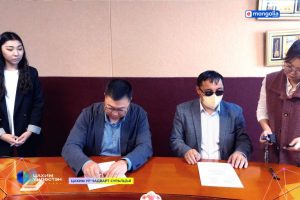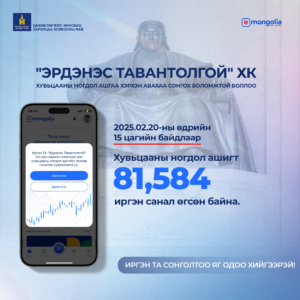The Director of the System Integration Department at the "E-Mongolia Academy" state owned enterprise, S. Tulga, addressed common questions from citizens regarding the updates and security of the E-Mongolia system.
– Hello. The E-Mongolia system has made government services faster, easier, and more accessible, becoming an essential part of citizens' daily lives. Let's start by explaining how this system works.
The E-Mongolia system delivers government services not only through mobile applications and web portals, but also through in-person service operators, kiosks for citizens living abroad, and other accessible channels, providing a comprehensive solution to access services easily.
How does the system work? After logging in and authenticating via the identification system (DAN), the user’s information is retrieved through the HUR (State Information Exchange) system from the relevant government agency. The system then generates certificates and documents. For multi-step services, the request is forwarded to the respective government official for processing.
In other words, we do not generate new personal data in our infrastructure. We only use data created by responsible agencies in real-time through the HUR system to provide services.
- It has been over four years since the E-Mongolia system was launched. Over this period, citizens accessing government services online have saved both time and money, leading to clear benefits for all parties. What are the economic impacts of this?
In 2019, the Mongolian government launched the E-Mongolia project, which officially began on October 1, 2020, offering citizens the ability to access 181 services from 23 organizations via mobile devices. Today, 1,263 services from 87 organizations are available online. Over the past four years, the system has successfully served 1.9 million users with 62 million transactions, saving an estimated 1.2 trillion tugriks since its launch.
Traditionally, accessing government services would take citizens an average of 2.5 hours. With the E-Mongolia system, services can now be obtained in just 3 minutes. On average, each citizen accesses government services six times per year, equating to a loss of about 15 hours, or 2 full working days annually. Every day, about 7,580 citizens access government services. When factoring in travel, waiting, and receiving services, a total of 18,950 hours are spent daily on government services.
By using the E-Mongolia system, Mongolian citizens save the equivalent of 3,182,876 sheets of paper each month — enough to cover Sukhbaatar Square with six floors of paper.
Additionally, the "E-Mongolia Academy" provides digital skills training to enhance accessibility to government services. So far, 67,750 citizens and public servants from 21 provinces and 9 districts have participated in online and in-person training sessions.
- How do you ensure the security of users' personal information and maintain data protection?
The security of personal data is of the utmost importance and must be strictly protected. The data we store includes information related to certificates, requests, and documents, and we ensure its full security through the National Data Center and advanced international technologies. We are also in the process of implementing ISO 9001 and ISO 27001 standards. For instance:
- Every user's access flow is encrypted using an algorithm, making it impossible to decrypt.
- External access is protected with a two-level security system.
The first level uses a Cloud WAF (Cloud Web Application Firewall) to analyze all traffic and ensure security.
The second level involves the National Data Center's security team monitoring and analyzing all transmitted data to ensure protection.
- Some users experience delays when accessing the E-Mongolia app, with messages such as "updating information." What is being done to improve the speed?
We continuously improve the E-Mongolia system, adding new services and features, with updates released weekly. Whenever users log in, they check for any new versions and, if available, download them, which reloads the app. Each update is typically very small, around 100KB, and any delay is generally related to internet speed. However, if there is an error in the service, it may be due to the specific service provider or agency.
- What are the most commonly accessed services on the E-Mongolia system?
As mentioned earlier, the E-Mongolia system provides 1,263 services from 87 organizations. The most frequently used services by citizens vary based on their needs, but the most popular include:
- Social security contribution certificate – 14,183,927 requests
- Civil ID certificate – 5,547,285 requests
- Residential address certificate – 4,060,166 requests
- Driver’s license information – 3,101,494 requests
- Credit report certificate – 2,647,994 requests
- Health insurance payment verification – 2,185,212 requests
- Vehicle fine information – 2,951,143 requests [GU1]
We continue to analyze citizen needs and add requested services promptly to meet the demand.
- How are complaints related to E-Mongolia services handled?
The Customer Service Department of "E-Mongolia Academy" state owned enterprise, receives feedback and complaints via the 11-11 hotline and social media platforms 24/7. These are forwarded to the relevant agencies for resolution, and citizens are guided accordingly. We also ensure follow-up when calls are missed or dropped to resolve issues effectively.
- Where does Mongolia stand globally in terms of e-government rankings? What are the future goals for the E-Mongolia system?
Our goal is to develop a "Smart E-Mongolia" system, which will use artificial intelligence to handle requests and decision-making processes for government services, as outlined in the Mongolian government's 2024-2028 action plan.
As of 2024, Mongolia has advanced by 28 places to 46th, marking a significant achievement. We aim to further enhance the variety, quality, and accessibility of digital services.
Additionally, Mongolia ranked 58th in the Global Innovation Index in 2020, 71st in 2022, and 67th in 2024.
Бид цаашид МОНГОЛ УЛСЫН ЗАСГИЙН ГАЗРЫН 2024-2028 ОНЫ ҮЙЛ АЖИЛЛАГААНЫ ХӨТӨЛБӨР-т тусгагдсаны дагуу төрийн бүх төрлийн үйлчилгээг хиймэл оюуны тусламжтайгаар хүсэлт шийдвэрлэх чадавх бүхий “Ухаалаг E-Mongolia” системийг хөгжүүлэх зорилтыг тавин ажиллаж байна.
We would like to thank all citizens who have embraced digital transformation through the E-Mongolia system, saving time and supporting the shift to electronic government services.
Thank you for your time in speaking with us. We wish you continued success in your work!



